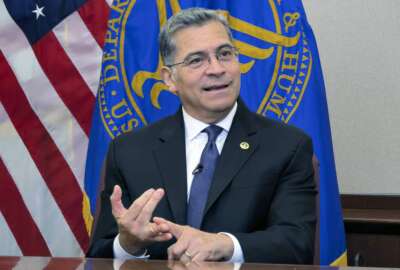Government telework, a failed financial system on congressional radar
The big picture is the 2025 budget, and Congress will have to deal with that when it returns.
The big picture is the 2025 budget, and Congress will have to deal with that when it returns. But legislation on federal telework, hiring and other issues are on the docket. And members are alarmed about a financial system update that’s got the National Oceanic and Atmospheric Administration in a tornado. An update now from Bloomberg Government Congressional Reporter Jack Fitzpatrick.
Interview transcript:
Tom Temin
And the thing we love about Congress is, even when they’re not in session, there’s lots to talk about. And let’s just start with what the big budget picture looks like now. The election is complicating even the idea of a continuing resolution.Jack Fitzpatrick
Yeah, it’s been a complicated issue to talk about what to expect with the continuing resolution. Members of both parties agree there’s not going to be an actual funding deal by Sept.30, which is the deadline. There is a question, though, of how long a stop gap will go. And the debate really is on the Republican side, in particular. The hard line conservatives Freedom Caucus members have said we feel good about the likelihood of the election going our way, not just at the presidential level, but the Senate map looks great for Republicans. We should hold out and get a funding deal next year, when Republicans expect to have more votes somewhere, if things do go well for them in November. However, appropriators other sort of leadership aligned people, especially led by the appropriations chairman in the house, Tom Cole have said, let’s get this off of our plate so that if Donald Trump does win the presidential election, he doesn’t come into office immediately facing a shutdown early on, when he’d rather be focusing on getting Cabinet members into place, establishing a legislative agenda really, focusing probably on a tax bill. So there’s a debate among Republicans in Congress as to what the best strategy is, how long a stop gap should go if lame duck negotiations are actually a good idea. And now that the presidential race looks much more competitive in a lot of the polls lately, seem to show up a narrow edge for Kamala Harris that makes it even harder to predict, because it’s not just an argument about how to help a Republican president. You don’t know who’s going to win, so a lot of things are up in the air as to whether they even want to have lame duck conversations, but they do at least have to do a stopgap by Sept 30.Tom Temin
Yeah, this one is not Eisenhower and Adlai Stevenson in 1956 when you could pretty well confidently predict a landslide, although Congress went a different way. This is a close one, and so the stakes are pretty high. It’s a high wire act.Jack Fitzpatrick
It is a high wire act, and there’s a lot of variables going into this. Again, the presidential race is competitive, the House down ballot effect of that is still pretty unclear. It’s probably pretty competitive. Again, the Senate map really benefits Republicans. If Democrats had a great year and they won the presidency, maybe they could manage 50-50 with the tiebreaker, but it could be a trifecta for Republicans. That’s not out of the range of possibilities. But also very well, could be a divided Congress, and so everybody’s kind of in wait and see mode in terms of, do we really go for a big deal in the lame duck? And a lot of the conversation has been about government funding, but they do have an upcoming debt limit deadline. Technically, the deadline is Jan. 1, but when they use extraordinary measures, they can buy some number of months of extra time. So it may be a spring or summer deadline. There hasn’t been a lot of talk about how to approach that if they should approach that in the lame duck. So at this point, they’re just a ton of questions that kind of hinge on election results at the Presidential, Senate and House level. And when they come back in September, there’s going to be some preparatory work, but a lot of it is going to hinge on November, and people are going to have to make quick decisions about whether they really feel like negotiating on government funding and the debt limit.Tom Temin
So for federal agencies, the limbo really is limbo at this point.Jack Fitzpatrick
Yes. Should you expect a stop gap into November, December, like you would often see, or does it go into calendar year 2025, that is a very active question that people don’t know the answer to. And if it does go into calendar year 2025, How long do you go? You don’t want an inaugurated president to immediately face a deadline. So is it March? Because that’s doable. It’s really unclear right now what the length of a stopgap would be.Tom Temin
We’re speaking with Jack Fitzpatrick, congressional reporter at Bloomberg Government. And tell us more about what’s going on, because senators, at least, are some members of Congress, have sniffed this one out and are asking tough questions of the Commerce Department on that NOAA financial system update that failed.Jack Fitzpatrick
Yes. So this is a new finance system that the Commerce Department plan for the whole department. They launched it for the National Oceanic and Atmospheric Administration back in October, and had a ton of problems immediately. I had previously reported that it stopped payments from going through on some of their electric bills that led some NOAA facilities to get power shut off. It also led to a union grievance because they weren’t issuing travel reimbursements to their own employees for a number of months. In some cases, it’s been a messy issue, and as more information has come out, it’s clearly a wider range of issues. They’ve gotten some pressure from Congress, because there were members who had constituents waiting on disaster aid for fisheries. Senator Patty Murray (D-Wash.) and Senator Lisa Murkowski (R-Ark.), two powerful appropriators, the appropriations chairs, Patty Murray brought this up in May, saying they wanted to know what was going on with disaster assistance for their constituents. At the time, Gina Raimondo said there have been issues, we’re not out of the woods with this finance system, the bass finance system, but the software is working. However, there are documents showing continued flow of complaints from employees, problems with reimbursements, with invoices, with inaccurate information on contract documents in their system. So it seems to be a very wide range of problems, a long lasting issue. We’re going on almost 11 months now, and they’ve still got a lot of problems at NOAA.Tom Temin
So this is the kind of thing that Congress gets interested in, and GAO inquiry to follow. Sounds like.Jack Fitzpatrick
Yeah, well, there was an inspector general inquiry that came out from the Commerce Department Inspector General. That was published in December of last year, after a couple months of struggles with this, but it didn’t have a ton of information on exactly what caused the problem, what the extent of the problem was. I’m not sure it was even clear at that point, even to inspector general employees, what was going on? They blame some data mismatches, but didn’t have a lot aside from that, in terms of how much of this was a matter of technical difficulties, where their problems in implementing the software. And at this point, it’s clear that there’s a variety of that. Server errors, employee confusion, and a a wide array of technical and human problems with using the system.Tom Temin
Right? You don’t want your secretary to have to talk about it to Congress, though, and that’s how it comes to light, because that’s never good for what happens downstream.Jack Fitzpatrick
Yes. And that is something to watch in the future, because in the bill to fund the Commerce Department in the Senate, there was a note in the report accompanying the bill expressing concerns about the rollout of this, asking to stay on top of it. Usually those committee report notes that accompany an appropriations bill are a good sign of what is concerning to the members of Congress that control the agency’s budget. So it is something that members of Congress are watching. They brought it up publicly with the Commerce Secretary, and I would expect some level of continued oversight on this in the future, all right.Tom Temin
And then on other matters, there are some minor bills, with respect to federal telework and hiring practices that could be codified that agencies have been trying. Give us just a handicap on that type of activity. Again, Congress is out till the middle of September. These are crucial for the agencies, but will they really get around to those this session?Jack Fitzpatrick
It’s tough to handicap that. It’s a really significant issue because there’s a lot of interest among members of Congress in both chambers about telework policy, where locality pay applies if you’re supposed to be working in an expensive city like DC, but you don’t come in often. There’s a lot of interest in legislating on the issue, but also oversight measures. It questions from members of Congress saying, give us more information about how often people are going in, how many people are getting locality pay for different expensive areas. There are bills coming out. Bill Cassidy (R-La.), had a bill that was one of the stricter ones that came out recently, that would deny locality based raises and bonuses for anyone who is teleworking, even for one day a week. There are some lower thresholds and other bills. I would say it’s something to watch because, again, it’s played into appropriations. There’s language in appropriations bills and reports asking for more information. So even though we’re in an election year, we’re probably not going to see a lot of bills enacted into law for the rest of the year. The possibility of oversight measures being attached, maybe to a gun government funding package if they get something done in the lame duck. That is something to watch. It’s something where there’s a lot of interest. Now’s not the peak time for legislating and doing bipartisan work, but there is bipartisan interest in it. So it’s an active issue. And there’s always the NDAA. Yes, the NDAA, and that’s an issue with DoD. It’s a huge employer. So measures being inserted, if not into the legislative text, but alongside the legislative text in the NDAA or a government funding package. That’s something to watch as interest builds for the future, because eventually there probably will be some bipartisan action, saying, here’s what we expect in the future of federal telework. But as of now, it’s kind of a mix of legislating and seeking more information.
Copyright © 2025 Federal News Network. All rights reserved. This website is not intended for users located within the European Economic Area.
Tom Temin is host of the Federal Drive and has been providing insight on federal technology and management issues for more than 30 years.
Follow @tteminWFED






